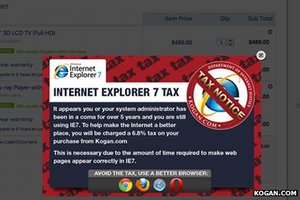 This news was first reported a couple of weeks ago and has got me thinking quite a bit. For those that missed it, Australian electronics retailer Kogan.com decided to put a 6.8% tax on anyone who checked out of their online store using Internet Explorer 7. The decision to do so was taken by their Chief Executive based on the fact that his web team spent as long getting the website to work in IE7 as it did in all the standards compliant browsers put together. Understandably, as only 3% of their customers used IE7, this was quite frustrating to him.
This news was first reported a couple of weeks ago and has got me thinking quite a bit. For those that missed it, Australian electronics retailer Kogan.com decided to put a 6.8% tax on anyone who checked out of their online store using Internet Explorer 7. The decision to do so was taken by their Chief Executive based on the fact that his web team spent as long getting the website to work in IE7 as it did in all the standards compliant browsers put together. Understandably, as only 3% of their customers used IE7, this was quite frustrating to him.
It is a frustration shared by most web designers. If you write your markup and code professionally and to agreed standards it should work across all the common browsers. Even IE9 mostly follows the rules, provided you don’t ask it to do anything too clever. But IE7 and 8 together combine for more users than IE9, so you still have to spend the extra time coding and testing for these browsers. Most web designers are just relieved they don’t have to deal with IE6 any more. This extra work is generally seen as just the cost of doing business on the web; you design a site to accommodate all the browsers it needs to, or you look bad to your customers and clients.
Kogan aren’t looking to make money from this tax, they’re looking to persuade IE7 users to upgrade (or change browser) and therefore avoid the tax. This will undoubtedly save them more money than getting 6.8% extra income from 3% of their customers. They may suffer some negative feeling from those few customers, but they’ve also gained international publicity which should more than offset that. I’d also like to think that those customers who upgrade will thank Kogan for the push once they get used to their much-improved browsing experience; maybe that’s wishful thinking.
To me, the most pleasantly surprising aspect of this is that the Chief Exec has listened to his development team’s problems, understood that they are not just excuses and moans, and taken a significant business decision based on that. Obviously there’s a marketing element to this decision too, but at it’s core the business has decided that it should take on and resolve this problem.
It will be interesting to see if other organisations follow Kogan’s example and implement an IE7 tax, or if this kind of publicity changes the public perception of ageing browsers and their users. It will also be interesting to see when Kogan decides it’s time for an IE8 tax.




One Comment
Having just fallen foul of IE8 deficiencies, I’d say this is a great idea. I wonder whether the big boys like Amazon will take note and do something similar. My guess is they won’t